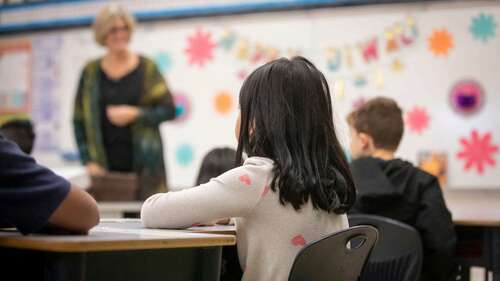School districts across British Columbia are increasingly recruiting uncertified teachers, according to provincial data, as educators report ongoing staffing shortages.
The figures, recently brought to light by CityNews and subsequently obtained by CBC News, show a nearly threefold increase in the number of Letters of Permission (LOP) issued — a letter authorizing individuals without certification to serve as educators — since 2019.
In 2023, 303 LOPs were granted in 2023 compared with 92 in 2019.
The numbers reveal how schools are struggling to cover a shortage of staff, says the B.C. Teachers’ Federation (BCTF), which is raising concerns about the consequent effect on children’s education.
“We have been sounding the alarm bells about a teacher shortage for close to a decade … it started off gradually but has now picked up steam,” union president Clint Johnston said during an interview with CBC News.
He says several factors, including B.C.’s spiraling cost of housing and early retirements during the pandemic, have led to a continued shortfall in qualified teachers across the province.
Under the provincial School Act, school boards are allowed to hire teachers who do not have a teaching certificate, but who are deemed qualified, to fill short-term needs.

According to the Ministry of Education, uncertified teachers are only hired when a certified teacher can’t be secured, and they are not permitted to work for more than 20 consecutive days.
If they do, they are required to obtain an LOP through the ministry’s Teacher Regulation Branch.
The extent to which individual school districts depend on uncertified teachers remains unclear — but Johnston.said “it shows how bad the teacher shortage is.”
As students return to school for the 2023-24 school year, teachers’ associations say the rapid growth in students combined with shortages in staff are hampering their ability to effectively support students.
The problem is even worse in northern B.C., says Daryl Beauregard, president of the Prince George District Teachers’ Association.
He says there are about 45 uncertified teachers on call in School District 57 this year, and over 60 were on call in 2023.
The district, which serves more than 13,000 students, according to its website, had about 96 vacancies at the start of the 2023-24 school year and filling those positions has been a challenge, Beauregard added.
“That does mean uncertified teachers have to take up [a lot of those] vacancies,” he told CBC News. “It’s not an ideal situation, it’s a temporary solution … uncertified teachers can be very committed, hard-working individuals, but at the same time, they’re not trained.”
Impact on education
Such staffing issues are affecting the quality of education in B.C., says Johnston.
“We certify teachers so that we have a standard in education,” he said.
“[Uncertified teachers,] no matter they’re doing their best, they’re not going to be able to do the same job and it impacts students and especially vulnerable students.”
School resources are also being affected as certain certified teachers are removed from their roles to cover classes.
Marilyn Carr, a certified teacher-librarian in Surrey, B.C., says she is often pulled from her daily duties if schools are unable to find someone to cover for an absent teacher.
“When I’m called to fill a classroom, that means my library is closed,” Carr told CBC Radio-Canada.
She says the school district for the fast-growing city has struggled to fill vacancies for certified substitute teachers to cover for day-to-day absences, especially since the pandemic.
“COVID-19 changed how people look at their health,” Carr said. “More teachers are taking the time to to be well … and that puts a strain on the system.”
In an emailed statement to CBC News, Minister of Education Rachna Singh acknowledged the challenges of filling teaching positions in the province.
“While our full-time teaching workforce in B.C. totals almost 40,000, the tight labour market is challenging us all,” she wrote.
The ministry says it has added close to 350 new seats in teacher education programs since 2018 and has changed certification standards so more internationally trained educators can work in B.C.’s classrooms.
The minister says the province is also going to fund a rural teacher education program next year, which allows students in remote areas to become certified teachers without having to relocate to a new community to attend university.




